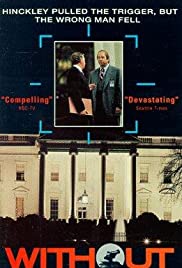
WITHOUT WARNING: THE JAMES BRADY STORY
US, 1991, 88 minutes, Colour.
Beau Bridges, Joan Allen, David Strathairn, Bryan Clark, Steven Flynn, Gary Grubbs, Susan Brown.
Directed by Michael Toshiyuki Uno.
James Brady was press secretary for Richard Nixon, about to become the leader of the press office when Nixon was elected. When John Hinckley attempted to assassinate Richard Nixon, others were shot in his attempt, including James Brady who had injuries to his head, below his brain. He was rushed to hospital, not expected to live, but major recovery, spending over a year in rehabilitation and recuperation.
Beau Bridges portrays Brady and won several awards for his performance. Joan Allen is strong as his wife, having to support him, at the end sometimes of his moods, especially when she was invited to participate with the anti-gun lobby. (The end of the film is, in fact, actual footage of Jim and Sarah Brady at a hearing on anti--gun legislation in 1991.) David Strathairn is his very sympathetic and patient doctor.
The film initially paints a portrait of a very jovial Brady, getting on well with the press gallery, married to Sarah and with a young son who does not understand what has happened when his father is shot, confined to bed, has seizures. Symbolically, the final sequence is the building of a kite, Sarah trying to keep it in the air but failing, the young boy working on it and the family then united in the flying of the kite.
Bryan Clark gives a sympathetic performance of President Reagan, especially visiting Brady in hospital with Nancy Reagan, honouring Brady – but Brady having to realise and accept that his memory is patchy and that he is not up to the task of Press Secretary even though his office was kept for him.
Interestingly, this was the last screenplay written by Robert Bolt (A Man for Seasons, Ryan’s Daughter, Lady Caroline Lamb, A Passage to India). Bolt himself had a severe stroke in real life and was cared for by his actress wife, Sarah Miles – an empathy for Jim Brady’s situation.
1. The significance of the film in its time? Gun legislation, the 1980s, the 1990s?
2. The screenplay written by Robert Bolt? His career? His own personal health history?
3. Audience knowledge of James Brady, at the time, subsequently? His role in the Reagan Administration? Press Secretary? Admired by Reagan, by his team, by journalists?
4. The assassination attempt on President Reagan? His being injured? The other members of the team being shot? James Brady and his head injuries?
5. The glimpse of John Hinckley, intense, his age, buying the revolver, the advice of the salesman, his obsession with Jodie Foster, writing to her, trying to visit her, her refusal? His motivation?
6. The brief attention of the film to Hinckley, the crowd, in the crowd, pulling the gun, the shooting, his being apprehended? Interrogated by the police? Admiring Reagan, being Republican, his motivation being personal? Sarah Brady watching the rerun on television?
7. Ronald Reagan, his background, election as President, the landslide? His personality, press conferences, working with Brady, Brady correcting him, reminding him? His being injured, recovery? His visiting Brady in hospital? Support? The office, Brady cutting the ribbon? The other members of the press team, Larry Speakes as associate, fronting the media? Supporting Brady in the aftermath of the shooting?
8. Brady in action, handling the correspondence, his quips, popularity?
9. Brady, his relationship with Sarah, her support? Their son? His age? Reagan’s selection, the group waiting for the phone call, Brady serious, then the excitement of his appointment? His nickname, the Bear? The images of Bear throughout? The sounds of the bear?
10. The shooting, the injuries to Brady? Sarah doing the cleaning, the television report, his death, the change of information? Going to the hospital?
11. The long months of treatment, surgery, rehabilitation? Dr Kobrine, his work, thoroughness, interactions with Sarah, information, her keeping the piece of bullet? The continued supervision, friendship?
12. Brady, possibility of his dying, possibility of brain damage? His gradual communication, finger movements, words, his head and binding, freer, in bed, the recuperation, the physiotherapy? His range of moods? Treatment of friends?
13. Sarah, her continued support, love for Brady, the sexual encounter? His domination, that he was the boss in the household? His severity towards her, the approach by the anti-gun lobby, his tantrum and hitting her? His later apology? The discussion about his job, his not being able to remember the names of correspondence, finally admitting that he could not do the job?
14. The visit from the doctor, his continued friendship, Brady and his defiance?
15. The sequence of the kite, the son and his age, upset about his father, seeing him have the seizure and not liking it? On the beach, Sarah and her awkwardness, flying the kite, its crash? Trying to mend it? The son and his eventually fixing it? Flying?
16. And the transition to the hearings about gun control, his speech, Sarah speech, his support of her?
17. A film about disaster without warning, the consequences, the challenge of recuperation and rehabilitation?